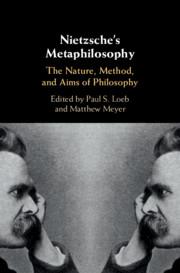Book contents
- Nietzsche’s Metaphilosophy
- Nietzsche’s Metaphilosophy
- Copyright page
- Contents
- Contributors
- Acknowledgments
- Note on Texts, Translations, and References
- Abbreviations
- Introduction
- Part I Evolving Metaphilosophies
- Part II The Nature of Philosophy
- Part III The Method of Philosophy
- Part IV The Aims of Philosophy
- Chapter 10 Nietzsche’s Aesthetic Conception of Philosophy
- Chapter 11 Metaphilosophy and Metapolitics in Nietzsche and Heidegger
- Chapter 12 Nietzsche’s Psychology of Metaphysics (or Metaphysics as Revenge)
- Chapter 13 “The Great Seriousness Begins”
- Bibliography
- Index
Chapter 12 - Nietzsche’s Psychology of Metaphysics (or Metaphysics as Revenge)
from Part IV - The Aims of Philosophy
Published online by Cambridge University Press: 24 October 2019
- Nietzsche’s Metaphilosophy
- Nietzsche’s Metaphilosophy
- Copyright page
- Contents
- Contributors
- Acknowledgments
- Note on Texts, Translations, and References
- Abbreviations
- Introduction
- Part I Evolving Metaphilosophies
- Part II The Nature of Philosophy
- Part III The Method of Philosophy
- Part IV The Aims of Philosophy
- Chapter 10 Nietzsche’s Aesthetic Conception of Philosophy
- Chapter 11 Metaphilosophy and Metapolitics in Nietzsche and Heidegger
- Chapter 12 Nietzsche’s Psychology of Metaphysics (or Metaphysics as Revenge)
- Chapter 13 “The Great Seriousness Begins”
- Bibliography
- Index
Summary
In a note from 1887, Nietzsche maintains that metaphysical beliefs are the products of ressentiment, and not the fruits of philosophical insight that metaphysicians take them to be. I aim to reconstruct Nietzsche’s attempt to explain metaphysics through an appeal to this distinctively human variety of vengefulness. By a metaphysical belief, Nietzsche understands a belief about entities that cannot be objects of human sensibility. Such entities form what he calls a “true world” – a realm of being that is both opposed to and more valuable than the realm of becoming that is present to us through the senses. I argue that, for Nietzsche, metaphysical beliefs satisfy ressentiment not simply by generating the value judgment that the sensible world is less valuable than the true world, but by generating in addition the judgment that this world ought to perish and the fantasy of that perishing. Thus, metaphysical belief is a variety of philosophical pessimism. I conclude by showing that Nietzsche explains the content of the metaphysical concepts “true” and “apparent” in the same way that he explains the content of the ethical concepts “good” and “evil.” In both cases, our thinking becomes moral as the result of a vengeful revaluation of values.
- Type
- Chapter
- Information
- Nietzsche's MetaphilosophyThe Nature, Method, and Aims of Philosophy, pp. 227 - 246Publisher: Cambridge University PressPrint publication year: 2019
- 3
- Cited by

